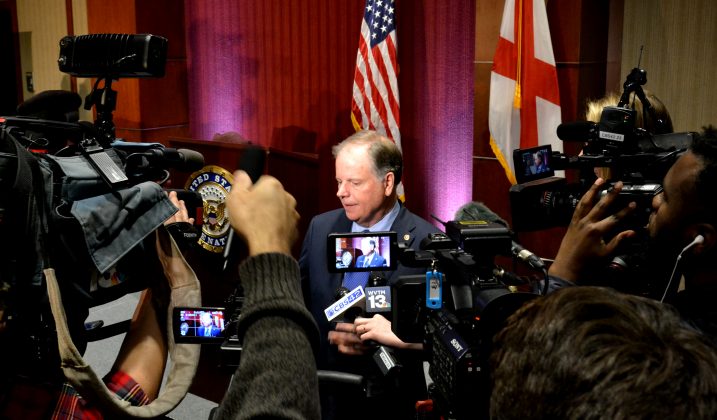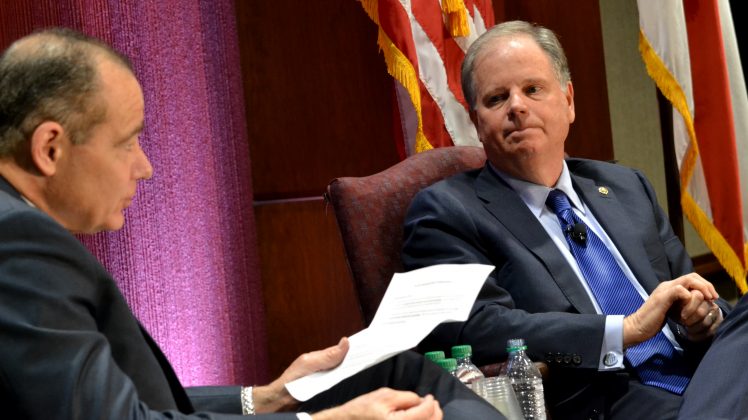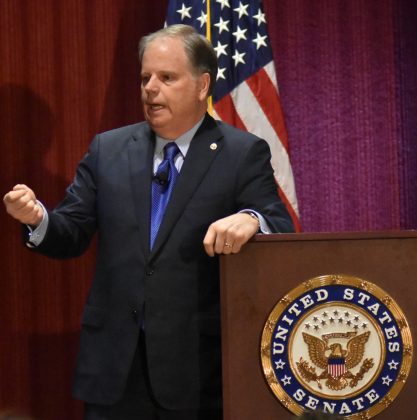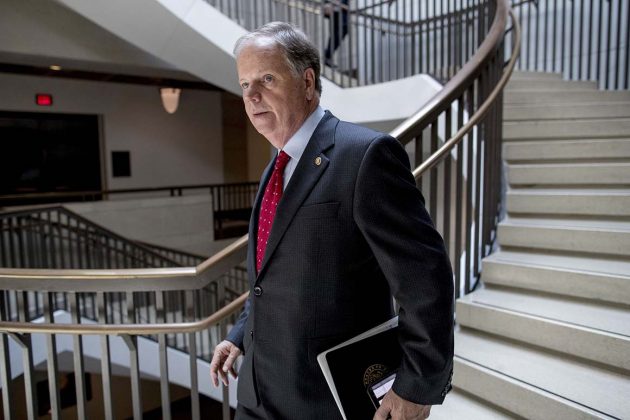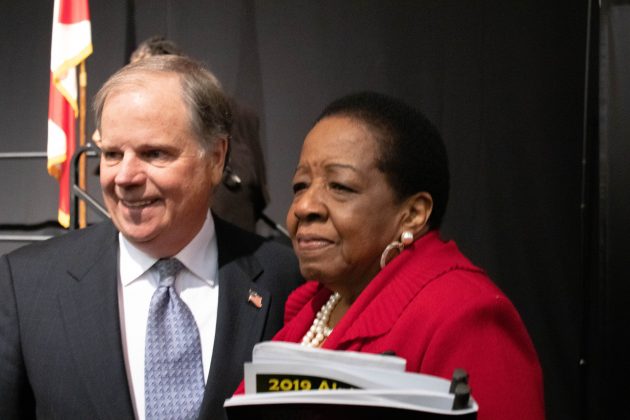
By Erica Wright
The Birmingham Times
For weeks, most eyes in Washington, D.C., and across the U.S. were on the junior senator from the state of Alabama—and Sen. Doug Jones wouldn’t have it any other way.
Would he or would he not vote to convict President Donald J. Trump on both articles of impeachment?
For Jones, the spotlight was not new. Most of the nation’s senators had already signaled their vote with a supermajority of Republicans saying they would vote to acquit and a supermajority of Democrats saying they would vote to convict. But what about Jones, the Democrat headed for a hotly contested re-election in November in the reddest of red states?
“Growing up in Alabama, I learned right from wrong,” Jones said on Twitter. “What the president did was more than wrong. Someone has to stand up & say so. I will fulfill my oath & vote in favor of both articles of impeachment.”
With that, some, like Republican National Committee spokesperson Kevin Knoth said Jones had “sealed his fate” and Alabamians “will remember this betrayal in November . . .” when Jones is up for re-election.
Others applauded Jones for taking a stand.
MSNBC political analyst Joy Reid, commented, “… the most courageous man in the United States Senate … was Alabama Senator @DougJones.”
But Jones didn’t see his vote as courage.
“I just do what I think is the right thing to do,” he said. “People may call it that way, but I’ve never considered myself brave.”
Last week, the Senate vote on both impeachment articles fell short of the required 67 votes in the Republican-dominated Senate to remove Trump from office.
Jones is a former U.S. attorney for the Northern District of Alabama who was successful in prosecuting two Ku Klux Klan members for the 1963 Sixteenth Street Baptist Church bombing in Birmingham that killed four black girls. In December 2017, he was elected to the U.S. Senate, defeating former Alabama Supreme Court Justice Roy Moore by 22,000 votes in a special election.
After more than just two years in the Senate, the question is—Can Jones hold on to the seat?
Recently, The Birmingham Times had the opportunity to sit with Jones for an hour-long interview at his Birmingham campaign headquarters and talk about his 2020 campaign and how he sees his path to re-election. Most of the interview occurred before the senator headed to Washington for the impeachment trial.
The senator was running a bit behind schedule for our one-on-one, but soon it’s clear why: He loves to engage people in conversation, whether it’s media, constituents, or colleagues, and he will stay around to chat. To speak with Jones is not like talking with an elected official; it’s like chatting with a neighbor who lives next door. Jones will talk about almost anything—pressing political issues, his dreams as a kid in Fairfield, the values instilled by his father who passed away at age 88 in December 2019.
“He taught me hard work, respect,” the senator said. “[He taught me to] take care of those you care about, to treat all people the same, and to understand that you can do anything.”
2020 Campaign
In September 2019, Jones launched his re-election bid in Birmingham under a theme of “One Alabama.” He chose that slogan for a reason.
“We have the same desires, the same things we’re looking for out of government,” he said. “We all want good health care, good education, good opportunities. We all want to make sure we treat each other with dignity and respect. That’s really ‘One Alabama.’ When I say that, I’m talking about those things we all have in common. … I can go into the Black Belt and talk to preachers and go to the Birmingham or Huntsville Chamber of Commerce and give the same speech about the same issues, localizing it for sure, but it’s really all the same thing.”
“One Alabama” is also important because Jones said he’s tired of the divisions in the state where he was born and raised, whether it’s on race, economics, or religion.
“It’s always us against them, and that’s why we want to emphasize ‘One Alabama.’ It’s important that people realize we are all in this together,” he said.
Jones explained that there’s a big difference between the candidate of 2017 and the candidate in 2020. He now can be judged on his record.
“I’m hoping folks will look at my record and see that I just didn’t get elected, get into Washington, D.C., and ignore them,” he said. “I’ve been doing those things that I think are important to those communities, and I have given a voice to those communities.”
Jones said he has traveled across Alabama, and many of the issues that people care about are some of the ones he’s been working on.
“Health care is still a dominant issue,” the senator said. “[Residents] have also been concerned about trade and trade policy [because] the administration’s trade war has hurt the state a good bit. Farmers, especially, have been hard hit by retaliatory taxes imposed by China, and I’m worried about those. Manufacturers have been affected, as well. Automobile manufacturers have been concerned because they don’t know if the president is going to slap taxes on foreign cars or foreign car parts.”
Senate Work
After being elected to the Senate in 2017, Jones said he immediately toured Alabama’s Black Belt region and saw serious sewer and sanitation issues.
“It’s a health crisis, a crisis of looking like we’re a Third World country—and we’re not,” he said. “Last year, we were able to secure additional funding for grant programs so people can upgrade their septic tank systems. We’re also doing some research … because it is very difficult for septic tanks [to] always function properly with some of the soil down there. We’ve been trying to get some research monies to make sure [septic tanks are working properly].”
Another of his driving issues has been “improving health care in rural areas, where we’ve been losing hospitals,” Jones said. “We’ve focused on community health centers. I’ve also been a strong advocate for expanding Medicaid, and that is getting a bit of traction. We’ve changed the Medicare wage index this year, so we are going to get more money into the state of Alabama [to help] more rural hospitals get more money.”
HBCUs
Since becoming senator, Jones also has focused on advocating for Historically Black Colleges and Universities (HBCUs) in Alabama and across the nation. In December, the senator announced final passage of his bipartisan legislation—the Fostering Undergraduate Talent by Unlocking Resources for Education (FUTURE) Act—to permanently renew annual funding for HBCUs and minority-serving institutions (MSIs) that had expired.
Jones joined a bipartisan group of his colleagues to announce a compromise deal to permanently fund HBCUs and MSIs, as well as take a first important step to simplify the Free Application for Federal Student Aid (FAFSA). That legislation was amended to strengthen privacy protections and approved in the House of Representatives by a vote of 319–96; it was signed into law by the president.
“This day has been more than a year in the making, and it will be a welcome relief to the HBCUs in Alabama that serve tens of thousands of our best and brightest,” Jones said in December. “Today, we are sending an important message of support for our HBCUs and showing in no uncertain terms that we believe they are vital to our system of higher education. … Our legislation also makes much-needed changes to the FAFSA form and will make it easier for more students to earn a college degree.”
Jones was instrumental in getting that law signed: “We pushed and pushed this fall on HBCU funding and got legislation passed that the president signed—and it won’t expire anymore,” he said.
On Friday, Feb. 14, Jones hosts his second annual HBCU Summit at Miles College in Fairfield with a full day that includes a career fair and panels featuring university leaders and students moderated by Jones.
Personal Time
When he’s not in the Senate, on the campaign trail, or meeting with constituents, Jones likes to hunt or fish.
“I love to go out in the woods and hunt, whether it’s a deer hunt, a turkey hunt, or bird hunting; any occasion that I can get out in a boat to fish. … Those are things I love,” he said. “I go to a bunch of different places [in the state]. I have friends that have farms or different places down in Greene County and Clarke County, right outside of Livingston. I’ve got a buddy that has a farm in Bibb County, and that’s where I go to hunt all my turkey.”
When he’s not enjoying the outdoors, Jones said he could watch movies like “Star Wars” on an endless loop. When the first “Star Wars” movie came out in the 1970s, Jones said he saw it more than a half-dozen times.
“I thought that was the greatest thing. I love those movies,” he said. “I love ‘To Kill a Mockingbird,’ too, and movies like that. I like action, but a movie like ‘To Kill a Mockingbird,’ [based on the 1960 classic novel of the same name by Alabama author Harper Lee about Atticus Finch, a fictional lawyer in the Depression-era South, who defends a black man against an undeserved rape charge], is always great. … I’m looking forward to seeing ‘Just Mercy,’ [which is based on a true story and follows young lawyer Bryan Stevenson and his history-making battle for justice as he works to free a wrongly condemned death row prisoner in rural Alabama].”
(It wasn’t surprising that after the impeachment vote Jones quoted Finch: “The one thing that doesn’t abide by majority rule is a person’s conscience.”)
Asked near the end of the interview what historical event he would love to have been a part of, the senator said, “I would have been the first man on the moon.”
“I grew up in that era, [during the space race, when the U.S. and the then–Soviet Union battled for superiority in space technology and flight]. When [astronaut] Alan Shepherd first went up, I was like 7 years old. If I wasn’t going to be the next [New York Yankees great] Mickey Mantle, I wanted to go into space. I was fascinated with it as a kid: I watched the Mercury 7 astronauts, the Gemini program, the Apollo missions.”
That’s a dream Jones still holds on to.
“[The late] John Glenn, [of Ohio], went up as a senator. Bill Nelson went up as a member of the Florida House of Representatives. … When I speak to friends at [the National Aeronautics and Space Administration (NASA)], I tell them, ‘If I’m going to adequately represent you in the U.S. Senate, I need to see firsthand what I’m paying for.’”
The need to improve health outcomes for families
By Erica Wright
The Birmingham Times
Not many senators in the nation’s capital can point to as many bipartisan bills focusing on improving health outcomes for women and children as Alabama Sen. Doug Jones can.
Jones has cosponsored a number of bills to improve access to rural health care for new and expecting moms; ensure that women can access affordable health care during and after pregnancy; and reduce the number of maternal deaths.
Alabama has an infant mortality rate of 7.0 deaths per 1,000 live births as of 2018, according to the Alabama Department of Public Health—higher than the U.S. 2018 rate of 5.7.
“We have a high maternal mortality rate, and it is even higher for women and children of color, in particular,” said Jones in a recent interview with The Birmingham Times. “Women of color die at three times the rate of white women when giving birth, and that is not related to their income or status in life. We’ve got bills pending to do research and find out why that is happening.
“There are some obvious reasons, [such as inadequacies in] rural health care and not having good access to health care in some of these areas, … but there is also a purely race dynamic that we are trying to figure out.”
Strengthening Families
Jones has cosponsored or backed a series of bills looking at strengthening families, including the Mothers and Offspring Mortality and Morbidity Awareness Act (MOMMA) and the Healthy Maternity and Obstetric Medicine (Healthy MOM) Act.
The Healthy MOM Act, for instance, would establish a special enrollment period for expectant mothers to sign up for health insurance. Currently, marriage, divorce, having a baby, adoption, and changing jobs are considered qualifying life events that trigger a special enrollment period—although becoming pregnant is not considered a qualifying event.
The bill would also guarantee 12 months of continuous Medicaid eligibility for postpartum women, thus removing key barriers that often prevent mothers from getting the care they need after giving birth.
“As a society, we need to focus on policies that strengthen families and provide the best health care possible for women and children,” said Jones. “This legislation would ensure that women have the resources and the health care they need during this important time.”
According to the Centers for Disease Control and Prevention (CDC), about 700 women die each year in the U.S. from pregnancy-related complications. Black women are about three times more likely to die from a pregnancy-related cause than white women. The Healthy MOM Act will work to improve these outcomes by expanding access to high-quality care, which data demonstrates could help prevent three in five pregnancy-related deaths.
Developing Solutions
Jones’s bill to improve access to rural health care for new and expecting moms would provide training for medical professionals and work to end rural disparities in maternal health. The bipartisan Rural Maternal and Obstetric Modernization of Services (Rural MOMS) Act would delve into the root causes of maternal mortality and develop solutions to improve maternal care in rural America.
“As I’ve traveled around Alabama to hear directly from women and health care providers about how we can improve maternal health outcomes in the state, they consistently raise concerns about the shortages of doctors and hospitals in rural areas,” said Jones, a member of the Senate Health, Education, Labor and Pensions (HELP) Committee. “This legislation provides real solutions by expanding care through telehealth, [or health-related services and information via electronic means], grants, and other programs to increase the number of health care providers in rural areas. [It also] takes important steps to address our unacceptable rate of maternal mortality in this country.”
The Maternal Outcomes Matter (MOM) Act of 2019 establishes grant programs within the U.S. Department of Health and Human Services (HHS) to support innovation in maternal health care and train health care providers to avoid discrimination in the provision of maternal health care services. The bill also holds HHS accountable for these grants programs by requiring the department to submit a report to Congress on outcomes and best practices.
“It is absolutely appalling that here in the U.S. we have one of the highest maternal mortality rates in the world,” said Jones. “We can and must do better, and this bill is an important first step in addressing the maternal mortality crisis and preventing future tragedies. All women in this country, regardless of race or socioeconomic background, deserve quality access to maternal care.”













